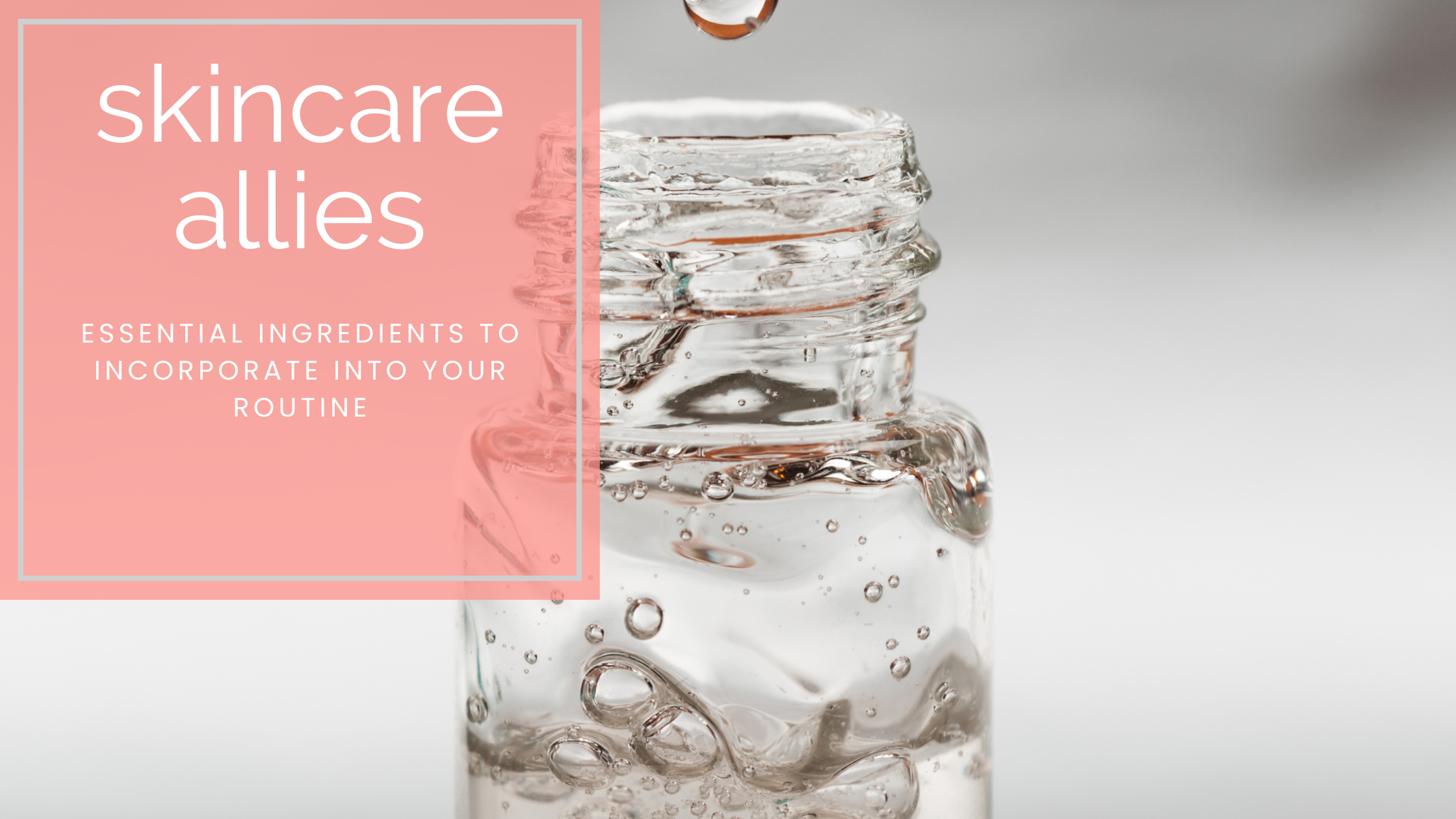
Which skincare ingredients are my allies? - Unmasking the Ingredients of Brilliance
As the winds of time gently embrace us, we embark on a journey where skincare becomes more than just a routine—it becomes an art of preserving and enhancing our natural beauty. We understand that you seek wisdom and guidance to navigate the ever-evolving world of skincare so we decided to unveil the hero ingredients that address common skincare concerns, empowering you to make informed choices and unlock your skin's true potential.

Hyaluronic Acid: As we age, our skin tends to lose moisture, leading to a loss of elasticity and the appearance of fine lines. Hyaluronic acid, a superstar ingredient, can work wonders in retaining moisture and plumping up the skin. How does it work? Well, It provides intense hydration because it is a powerful humectant, meaning it has the ability to attract and retain moisture. It can hold up to 1,000 times its weight in water, making it exceptionally effective in hydrating the skin. By delivering deep hydration to the skin, hyaluronic acid helps plump up the skin, improving the appearance of fine lines, wrinkles, and dryness.

It has been found to stimulate collagen production in the skin which helps maintain skin's firmness and suppleness. It also exhibits anti-inflammatory properties, making it beneficial for sensitive and reactive skin types. It can help reduce redness, irritation, and inflammation, providing a soothing and calming effect on the skin whilst at the same time improving the skin's moisture levels and enhancing its ability to retain hydration. This can lead to a plumper and more hydrated complexion, reducing the appearance of fine lines and dryness.

They also help enhance the skin's natural renewal process. It aids in exfoliation, promoting the shedding of dead skin cells and allowing healthier, more vibrant skin to surface. Regular use of lupine peptide can lead to a more radiant complexion and a smoother skin texture.
Lupine peptide contains antioxidants that help protect the skin from oxidative stress caused by free radicals. Free radicals are unstable molecules that can damage the skin's cells, leading to premature aging and other skin concerns. By neutralizing free radicals, lupine peptide helps prevent collagen breakdown, reduces the appearance of wrinkles, and promotes a more youthful appearance. It also has hydrating properties that help improve the skin's moisture levels. It assists in reinforcing the skin's natural barrier function, preventing water loss and maintaining optimal hydration.
And finally, lupine peptide possesses anti-inflammatory properties, making it beneficial for soothing and calming irritated or sensitive skin. It can help reduce redness, inflammation, and skin discomfort, promoting a more balanced and comfortable complexion.

Antioxidants: Environmental factors and free radicals can accelerate skin aging. Antioxidants, such as vitamin C and green tea extract, act as protective shields, neutralizing free radicals and supporting skin health. They basically help protect the skin against the damaging effects of free radicals. Free radicals are unstable molecules that are generated by various environmental factors such as UV radiation, pollution, and stress. They can cause oxidative stress in the skin, leading to premature aging, collagen degradation, and other skin concerns. Antioxidants work by neutralizing these free radicals, reducing their harmful impact and preventing oxidative damage.
Oxidative stress and the resulting free radical damage contribute to the aging process. By neutralizing free radicals, antioxidants help reduce the signs of aging such as fine lines, wrinkles, and age spots. They can support collagen production, promote skin elasticity, and maintain a more youthful appearance.
Antioxidants aid in the repair and renewal of the skin. They can enhance the skin's natural healing process, reduce inflammation, and support tissue regeneration. This can be beneficial for skin conditions such as acne, sunburns, and scars.The skin is constantly exposed to environmental aggressors such as UV radiation and pollution, which can lead to DNA damage and skin aging. Antioxidants act as a defense mechanism, helping to shield the skin from these external stressors and minimizing their impact on skin health.

It also has the ability to improve the skin's moisture content by increasing the production of natural lipids. It helps to prevent transepidermal water loss, ensuring that the skin remains adequately hydrated and plump. This moisturizing effect can be beneficial for all skin types, including dry and dehydrated skin.
Vitamin B3 has been shown to stimulate collagen production in the skin. By promoting collagen synthesis it can help reduce the appearance of fine lines, wrinkles, and sagging skin, leading to a smoother and more youthful complexion.
It's ability to brighten skin and help fade hyperpigmentation, dark spots, and uneven skin tone makes this a very appealing ingredient. It inhibits the transfer of melanin (pigment) to the skin's surface, resulting in a more even complexion. Regular use of niacinamide can help improve skin tone and achieve a brighter, more radiant appearance.
Niacinamide has the ability to regulate sebum production and reduce excess oiliness, which can contribute to the appearance of enlarged pores. By controlling sebum levels, niacinamide helps minimize pore size, resulting in a smoother and more refined skin texture. It's anti-inflammatory properties, make it beneficial for calming irritated or sensitive skin helping reduce redness, blotchiness, and inflammation associated with conditions such as acne, rosacea, and eczema.
Getting older is an absolute privilege and should be a time of beauty and self-discovery, and with the right skincare ingredients, you can embrace your age with grace and confidence. By incorporating some of the above ingredients into your skincare routine, you can nourish and revitalize your skin, revealing a youthful glow that reflects the wisdom and vitality within you.
Take care,



